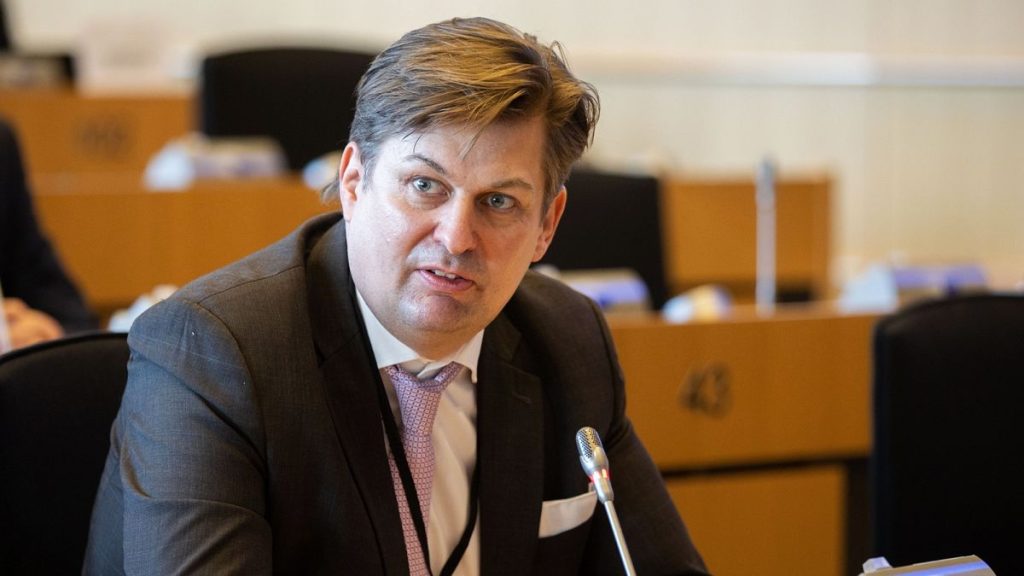Law enforcement officials in Brussels conducted searches in the offices of far-right MEP Maximilian Krah on Tuesday morning. This comes after Krah’s assistant, Jian Guo, was arrested for allegedly spying for China. The European Parliament gave its consent for the searches to be carried out, citing orders issued by the investigating judge of the Federal Court of Justice and a European Investigation Order. The search, led by Belgian police with German authorities as observers, covered both Krah’s and Guo’s offices. Guo is accused of working as an employee of the Chinese secret service and passing on information about European Parliament negotiations to Chinese intelligence, as well as spying on Chinese dissidents in Germany. The investigation, labeled Chinagate, has sparked political outrage and comes amidst concerns about Russian interference and upcoming parliamentary elections in June.
Maximilian Krah, a prominent member of Alternative für Deutschland (AfD) who sits with the far-right Identify and Democracy (ID) group in the European Parliament, has responded to the arrest of his assistant by stating that he learned about it from the press and did not have further information to share. Krah later confirmed that Guo had been dismissed from his position. The European Parliament spokesperson stated that the institution cooperates with law enforcement and judicial authorities to assist in the course of justice, which is why access to Krah’s office was permitted for the search. Despite the ongoing investigation and allegations, Krah remains the top candidate for the AfD in the upcoming elections in June, where he will seek a new term. He has affirmed that he will continue as the lead candidate despite the accusations and the need to refocus the election campaign on European issues.
Pro-European parties have seized on the allegations of Chinese and Russian influence to criticize the far-right as a threat to democracy and European values. The AfD, already losing support in German opinion polls, faces increased scrutiny over its association with the accusations of espionage. However, accusations of foreign intrusion are not exclusive to the far-right, as in late 2022, three members of the Socialists and Democrats (S&D) were involved in a cash-for-favors scheme allegedly paid by Qatar and Morocco to influence decision-making in the European Parliament. The scandal, known as Qatargate, led to the implementation of a stricter code of conduct within the institution to address the negative publicity. The uproar surrounding foreign interference highlights the need for transparency and accountability within the European Parliament.
The searches in Maximilian Krah’s offices come at a time when Chinese President Xi Jinping is touring three European countries: France, Hungary, and Serbia. Despite the controversy surrounding his assistant’s arrest, Krah has remained steadfast in his position as the AfD’s top candidate and has reframed the election campaign to focus on European issues. The ongoing investigations into foreign interference underscore the importance of safeguarding democratic processes and protecting European values from external influences. The political fallout from the espionage allegations further complicates the landscape ahead of the parliamentary elections in June, with the far-right facing additional challenges in maintaining public support. The European Parliament’s cooperation with law enforcement in the case demonstrates a commitment to upholding the rule of law and ensuring accountability for those implicated in acts of espionage or foreign interference.
The allegations of espionage and foreign interference have triggered a wave of political backlash against the far-right in Europe, with pro-European parties seizing on the opportunity to portray them as a threat to democracy. The concerns about Chinese and Russian influence have further undermined the credibility of parties like the AfD, which have faced accusations of being susceptible to external manipulation. Calls for greater transparency and accountability within the European Parliament have intensified in response to the various scandals that have come to light in recent years. As the investigations continue and the political fallout unfolds, the need for stringent measures to prevent future instances of foreign interference becomes increasingly urgent. The repercussions of the espionage allegations will likely reverberate throughout the political landscape in Europe, shaping the discourse and debate leading up to the elections in June.













